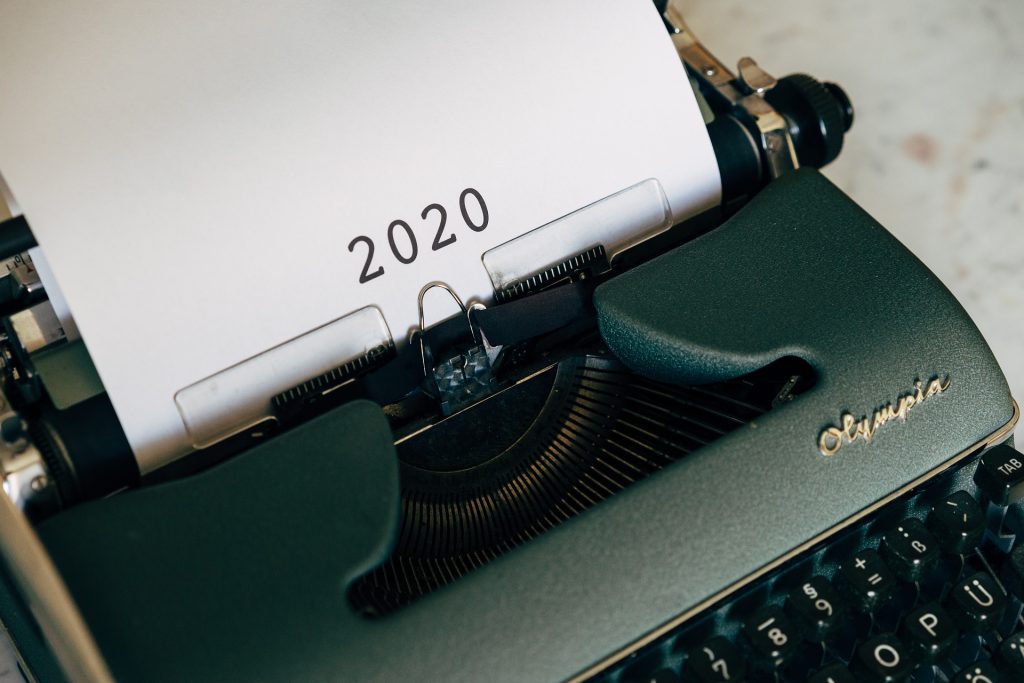PLEASE NOTE: This is Part 1 of a portion of the Year-End Summary that Jeremy Roll writes each year for his Investor Group. He granted Left Field Investors permission to publish excerpts of the report. If you would like to contact Jeremy, please see his contact information at the end of this article.
While you might recall from last year’s Year-End Summary (2019) that I was anticipating a recession in 2020 or 2021 due to the inverted yield curve, I clearly did not expect the recession to be caused by an event as severe and all-compassing as a global pandemic. There is no doubt that, in retrospect, 2020 could be very well prove to have been the most unusual and, for some of us, the most challenging year of our entire lives from a social, emotional, and economic perspective (for example, I know several people who either passed away or were severely impacted by Covid). And 2020 was, without a doubt, a historic year from a financial markets perspective. From starting the year with historic high prices for both real estate and the stock market, to a stock market crash that brought the S&P down more than 35%, to the quickest ever stock market recovery in history only weeks later, 2020 was certainly a highly volatile year that was, in the end, very quickly stabilized by unprecedented quantitative easing, stimulus, and other government intervention that resulted in trillions of dollars of incremental long-term debt for the US. While, in the short-term, the majority of US citizens and businesses were likely very appreciative of all of the stimulus and support they received, the huge increase in debt increased the burden of an already significant amount of debt and will very likely have significant long-term consequences for the US economy (please see the “Thinking Further Ahead – Debt, The Next Cycle And Beyond” section further below for more on the potential long-term consequences of our increasing debt).
As you know, I have been writing Year-End Summaries for our group for many years and I have been investing in passive cash flow opportunities since 2002 and I have absolutely no doubt that 2020 proved to be the most unusual and unpredictable investing year since I began my passive cash flow investing journey. While the 2008/2009 recession and housing crisis was, without a doubt, the worst recession that the US had experienced in many decades, the 2020 recession and pandemic was truly on a whole other level in terms of its global economic and social impact. Here in the US, for example, it’s unbelievable to contemplate that the level of new jobless claims has actually been higher every week since March 2020 than the previous peak (i.e. worst) week during the entire 2008/2009 recession (CLICK HERE to view this chart for both 2020 and historical levels). In fact, this data point is only one of many from 2020 that truly illustrates the expression “off the charts” and if there’s one phrase that summarizes what we experienced this year both in the US and across the globe in terms of the pandemic’s economic and social impact in 2020 it’s: “2020: Off The Charts”.
Here are several additional data points that demonstrate the magnitude of the pandemic’s and recession’s impact on the US economy over the last 12 months:
- An astounding ~20% of restaurants have permanently closed in the US in less than a year, with more expected to close in 2021.
- An unbelievable 49% of American households had lower incomes in 2020 compared to 2019.
- An incredible 20-25% of all US tenants are behind in paying their rent, with the average delinquent tenant owing more than $5,700 in unpaid rent as of the end of 2020.
- The S&P 500 tumbled roughly 35%+ during a 4 week period that started in February 2020 and then jumped more than 50% over the next 9 months to reach its all-time high in early January.
- The Nasdaq composite index jumped over 100% in only 9 months from its low in March 2020.
- The US government took the following unprecedented steps to reduce the economic impact of the pandemic:
- Stimulus and quantitative easing (QE) programs that amounted to $4T+ in additional spending in 2020 alone, with $1.9T+ just passed by President Biden and speculation that an additional large round ($2-4T) of stimulus/infrastructure spending will be proposed this summer/fall.
- Mortgage deferral programs for homeowners.
- Eviction moratoriums for renters.
- Rent subsidies from various state and local governments for landlords on behalf of tenants.
- Shockingly, the US government printed money at the pace of almost $5B per HOUR during parts of December 2020 (this is not a misprint).
Government Intervention And Why I Am Still On The Sidelines
While all of the bullets above no doubt demonstrate the extreme data that is associated with 2020, there is one common theme that impacted society and investors as a whole in 2020: government intervention. Most people would agree that without any government intervention the recession we experienced in 2020 would have been significantly worse and the S&P 500 wouldn’t have rebounded nearly as much (if at all) from its 35%+ drop. Yet, while government intervention was clearly very helpful for society in the short-term, it’s unclear (from an investor’s perspective) how the economy, markets, and asset prices will unfold once government intervention subsides. In addition, the immense amount of increased government debt will likely affect future US economic growth and will therefore affect investors in the long-term (please see the “Thinking Further Ahead – Debt, The Next Cycle And Beyond” section further below for more thoughts on this). While I am truly thankful that the millions of Americans who needed help received it via the massive government intervention programs, it’s important to understand how investors were and will be impacted by additional government intervention and the extension of various government programs (ie. eviction moratorium, etc) because they bring us further away from a “free market” environment and therefore create an artificial environment in which predicting the optimal timing to invest in various asset classes becomes more of a function of predicting government intervention as opposed to relying on historical cycle data to help extrapolate the most probable future scenarios and outcomes. Because government intervention has delayed the effects of the current recession, foreclosures, evictions, and other items, investors must now wait until the government intervention subsides to understand how the recession will impact rent collections, vacancies, and asset prices.
This Year-End Summary is particularly timely due to both the recent inauguration of President Biden and the runoff elections in Georgia, as both will likely have significant implications for investors in 2021 and beyond. The wins that the Democrats experienced in the Georgia runoff elections in January have resulted in what I believe will be a more predictable landscape for investors in 2021 (or least the first 6-9 months of 2021) but a less predictable landscape for investors thereafter and in the coming years. Given the Democrats’ focus on providing as much stimulus as politically feasible, I think the highest probability scenario for 2021 is that we will experience another round of stimulus (beyond the current $1.9 trillion round of stimulus and possibly as a combination of a reduced pandemic stimulus combined with an infrastructure and green initiatives stimulus) perhaps this summer or fall, which should help to support asset prices (both in the stock market and real estate) until at least this summer if not for the rest of 2021. But it’s also important to consider some other measures that the Democrats will likely pass, such as higher corporate and personal taxes, as well as less favorable policies for real estate investors (ie. less favorable depreciation, the possibility of reduced or eliminated 1031 exchange benefits, etc), which could create headwinds for investors in the coming years. Given that projecting what will occur in 2021 is very challenging without knowing exactly how much stimulus will be approved and deployed and without knowing how long eviction moratoriums and rent subsidies, among other government intervention, will continue, there is clearly a lack of predictability for investors in the medium term that I believe will likely subside in the next 6-18+ months once government intervention subsides. With that in mind, I am waiting for the following 6 events to unfold before reassessing whether I should change my stance of being mostly on the sidelines (these points are in no particular order):
- End of or great reduction of stimulus
- End of eviction moratoriums
- End of rent abatements
- End of rent subsidies from state and local governments
- End of mortgage payment deferrals
- Finalization of tax increases and updated real estate policies (including potentially updated capital gains tax rates, 1031 exchange rules, etc.)
While I have no doubt that some operators/sponsors/investors believe that the probability of lower asset prices in the next 12-24 months is low due to government intervention and they might end up being correct, we likely won’t need to wait very long (ie. 6-18+ months) to see what happens to markets and asset prices once government intervention decreases/subsides and, due to the potential downside risk, I intend to remain on the sidelines until the government intervention decreases/subsides to gauge the potential impact it will have on the economy, markets, and asset prices. From an investor risk/reward perspective, this is a relatively short period of time to wait given that the following risks could materialize across any asset class once government intervention reduces and/or subsides (due to the possibility of some tenants not being able to afford rent without government subsidies, low economic growth, a significant volume of evictions, etc):
- Increased vacancy
- Reduced rents as a result of increased vacancy
- Reduced profits / net operating income (NOI) as a result of reduces rents and increased vacancy
- Reduced asset prices as a result of reduced NOI and/or increased cap rates
With that in mind and with the exception of unique/unusual opportunities in terms of pricing and/or those opportunities that are less (or not at all) susceptible to reduced asset prices and/or reduced cash flow in the next 12-24 months, I will likely continue to remain on the sidelines while I wait for the 6 events that I outlined above to unfold so that I can better understand how/whether rents, vacancies, and asset prices will be impacted once government intervention subsides. While I continue to cautiously search for investments for myself and our group, I expect our group’s volume of opportunities will be low until the 6 events I outlined above unfold and the potential resulting effects (if any) on the economy, markets, and asset priced are understood.
Jeremy started investing in real estate and businesses in 2002 and left the corporate world in 2007 to become a full-time passive cash flow investor. He is currently an investor in more than 60 opportunities across more than $1 Billion worth of real estate and business assets. As Founder and President of Roll Investment Group, Jeremy manages a group of over 1,500 investors who seek passive/managed cash flowing investments in real estate and businesses. Jeremy is also the co-Founder of For Investors By Investors (FIBI), a non-profit organization that was launched in 2007 with the goal of facilitating networking and learning among real estate investors in a strict no sales pitch environment. FIBI is now the largest group of public real estate investor meetings in California with over 30,000 members. Jeremy has an MBA from The Wharton School, is a licensed California Real Estate Broker (for investing purposes only), and is an Advisor for Realty Mogul, the largest real estate crowdfunding website in the US. Jeremy welcomes e-mails (jroll@rollinvestments.com) to network with or help other investors and to discuss real estate or business investments of any size.
Nothing on this website should be considered financial advice. Investing involves risks which you assume. It is your duty to do your own due diligence. Read all documents and agreements before signing or investing in anything. It is your duty to consult with your own legal, financial and tax advisors regarding any investment.








